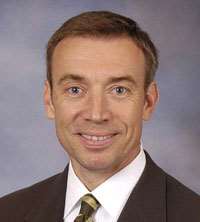Stephen Censky has served as ASA CEO for 21 years
By Diego Flammini
Assistant Editor, North American Content
Farms.com
U.S. President Trump nominated the current CEO of the American Soybean Association (ASA) to be the Deputy Secretary of the United States Department of Agriculture.
Stephen Censky has served as CEO of the ASA for the last 21 years. Prior to that, he served the USDA in the Reagan and George H.W. Bush Administrations.
Censky’s experiences make him a perfect fit to serve as USDA Deputy Secretary, according to a number of U.S. agricultural organizations.

Stephen Censky
“Nobody in agriculture is better equipped to assist Secretary Perdue in meeting the needs of farmers with practical solutions than Steve,” ASA president Ron Moore said in a July 14 statement. “He is a perfect fit for this role and we give him our strongest endorsement.”
“Steve knows firsthand the importance of increasing global demand for U.S. agricultural products, growing the renewable fuels industry, and protecting risk management programs,” Wesley Spurlock, president of the National Corn Growers Association, said in a statement.” His background and experience are especially welcome as we begin to shape the next farm bill.
““He is an aggressive advocate for farmers and truly understands how important international trade is to the ag economy, and how critical a strong crop insurance program is for farmers to farm another year when they experience a weather or economic storm,” Chandler Goule, CEO of the National Association of Wheat Growers, said in a July 13 statement.
USDA Secretary Perdue is eager to work with Censky, too.
“He will bring enthusiasm and a dedication to this country which will be great assets to USDA’s customers,” he said in a July 13 statement. “I am extremely pleased with the nomination for this key position and am hopeful that the Senate will take it up in short order.”
Before serving in the public sector, Censky earned his B.S. in agriculture from South Dakota State University and a postgraduate diploma in agriculture science from the University of Melbourne in Australia.
And he spent his childhood on a corn, soybean and diversified livestock farm near Jackson, Minnesota.